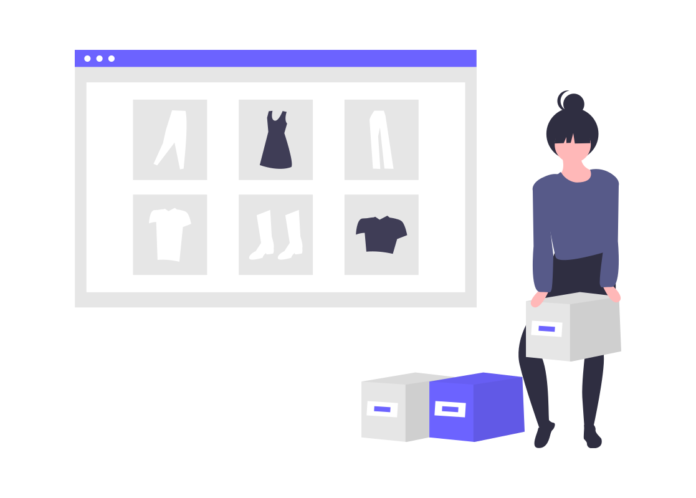Each year we hear of the increase in online sales, and as e-commerce continues to grow, there is a continuous increase in the notice of the death of brick and mortar. And now, this is turning to a new normal as people are more reserved about walking into the store post-COVID-19 lockdown. They would prefer to shop as many things as possible online as it gets easy to choose, place an order, and pay for goods and services you need.
The next step, therefore, is to opt for Shopify development that helps to take the brick & mortar store online. For brick-and-mortar companies to remain on their footing, they can make adjustments to stay sharp on their market and overcome their online competition.
Nevertheless, new threats are on the horizon, and retailers need not only survive the storm of Pandemic but also fight the existing online competition. The first goal should be to survive this new, uncertain market shift by keeping a clear roadmap to address the threat of e-commerce, using both technology and unique bricks and mortars advantages.
Many retail managers continue to wonder: How long can brick and mortar shops survive? Smarter retail leaders, however, ask: What must we do to survive – not only to prosper? Here are the quick and practical tips for beginning with.
Seamlessly blending online and offline sales
The end goal should be to synchronize online and in-store efforts. If you give an online discount, make sure that it’s also in the shop. If you see a customer selling the product online, but do not match the value in the store or vice versa, you miss a chance to build a lasting customer relationship.
It is essential to create a clear and helpful atmosphere for customers. It is a poor customer service experience to create a bad feeling that a customer always remembers.
There are many ways in which brick-and-mortar shops can maintain their share of the company and battle the growing e-commerce trend while participating in growth, rather than project success.
Build Partnerships to Add Value
Using online shopping, customers usually have to pay for delivery. There is a certain amount of purchase when individual companies offer special discounts or free shipping. Also, brick-and-mortar shops can use their strengths to provide customers with unique experiences that they would not get when shopping online. It includes exclusive online shopping, inviting customers to shop within particular hours to get discounts or free delivery.
And if needed, then you can tie up with a local delivery partner and instead blend in your business together with LLP registration online in India. This way, you can cover more audiences and grow locally by offering the right services at the right time. Brick and mortar shops often benefit from exclusive consumer experiences, such as unique in-store goods that they will not get to purchase online, invite customers to partake in promotions or rewards, and provide the consumer with convenience.
Be it a grocery store, restaurant, or a pharmacy store, try putting your customer-facing elements like making purchases, picking out the product, payment, etc.online. For this as well, you can join hands with the third-party as the idea is to offer value to the customers and gradually drive a business towards being sustainably profitable. Partnering with the delivery or technology partner will mostly ensure blending the audience for good and experiencing the symbiotic growth.
Anticipating consumers’ digital needs
When businesses introduce new technology to help link consumers on a digital level, they do not lose their emphasis on what matters most: their consumers. Innovative solutions would be useless if they do not fulfill consumers’ actual expectations and desires. The goal should be to improve and not substitute for the customer experience.
For top-notch, elevated-service businesses, people often trust relationships. You can find brokers who step away from brick and mortar locations, but there is still tremendous interest in the physical spaces. Customers want to see the salespeople with whom they will work on one of their lives’ most significant purchasing decisions.
Trend denial does not mean that you dismiss patterns. We know, and it is foolish to ignore your experiences, that many of our consumers are coming up to us first through digital channels. By developing intuitive platforms that allow our agents to communicate with our clients, we track these trends and remain actively digitally engaged.
Select initial products to place online
Ideally, your products or services should be strategically chosen, particularly when you just start. It is best to limit your inventory to around 100 of the hottest items on your online site if you have a wide range of goods to choose from in your brick-and-mortar shop.
When selecting products to carry online, make sure you choose items that are:
• Top brick and mortar sellers in your store.
• Items you receive 2-3 times a month for special requests or calls.
The latter is particularly relevant as it is challenging to find an individual stock on e-commerce sites for many customers. You can, therefore, begin by appealing to a broader audience instead of reaching out to only a specific market segment.
Conclusion
After your website is up and running, it’s time to build upon the framework you created in the days leading up to your store launch. Before you consider your new space or digital strategy, find your brand identity, customers, and audience. Build your online and physical spaces around that. If a piece of technology doesn’t fit, it’s better to skip it, even if it means taking a more traditional approach.
Bleak predictions for brick-and-mortar businesses are continually cropping up. But forward-thinking brands will find ways to forge new paths forward, ones that incorporate the best of digital and physical spaces. The customer experiences of the future will benefit from a balanced blend.









